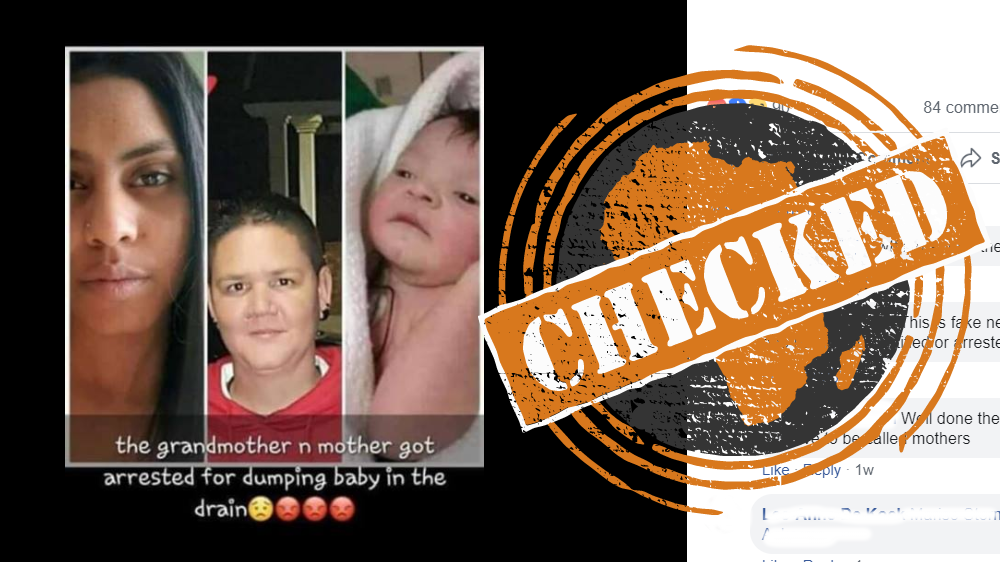A recent Facebook post claims a mother and grandmother have been arrested for dumping a baby in a drain in the South African city of Durban.
“There are so many people desperate for a child/baby,” one user commented. “You could've given her up for adoption. No excuse for what you did. Absolutely disgusting.”
The post shows photos of two women – supposedly the mother and grandmother – and a baby. It was published on 14 February 2019 and so far has been shared more than 1,900 times.

It comes after a baby was rescued from a storm water drain in Durban in early February. Residents had heard faint cries coming from a manhole in the early hours of the morning. A rescue team took three hours to reach the infant girl who was then airlifted to hospital.
But details around the incident are still unclear. Initially, news reports denied that anyone had been arrested and cautioned readers about fake social media posts.
On 18 February, citing the police, it was reported that a woman had been arrested for attempted murder in connection with the dumping of the baby.
No grandmother is mentioned in the report. There is no evidence that the women pictured in the Facebook post are involved in the crime. And a local community safety group has urged residents to stop circulating the picture.
As a general rule, if you suspect that a post may be false, or if a story has not been reported by other credible sources, it’s best not to share. - Africa Check (22/02/19)
“There are so many people desperate for a child/baby,” one user commented. “You could've given her up for adoption. No excuse for what you did. Absolutely disgusting.”
The post shows photos of two women – supposedly the mother and grandmother – and a baby. It was published on 14 February 2019 and so far has been shared more than 1,900 times.

Community asks users to stop sharing post
It comes after a baby was rescued from a storm water drain in Durban in early February. Residents had heard faint cries coming from a manhole in the early hours of the morning. A rescue team took three hours to reach the infant girl who was then airlifted to hospital.
But details around the incident are still unclear. Initially, news reports denied that anyone had been arrested and cautioned readers about fake social media posts.
On 18 February, citing the police, it was reported that a woman had been arrested for attempted murder in connection with the dumping of the baby.
No grandmother is mentioned in the report. There is no evidence that the women pictured in the Facebook post are involved in the crime. And a local community safety group has urged residents to stop circulating the picture.
As a general rule, if you suspect that a post may be false, or if a story has not been reported by other credible sources, it’s best not to share. - Africa Check (22/02/19)
Republish our content for free
For publishers: what to do if your post is rated false
A fact-checker has rated your Facebook or Instagram post as “false”, “altered”, “partly false” or “missing context”. This could have serious consequences. What do you do?
Click on our guide for the steps you should follow.
Publishers guideAfrica Check teams up with Facebook
Africa Check is a partner in Meta's third-party fact-checking programme to help stop the spread of false information on social media.
The content we rate as “false” will be downgraded on Facebook and Instagram. This means fewer people will see it.
You can also help identify false information on Facebook. This guide explains how.



Add new comment